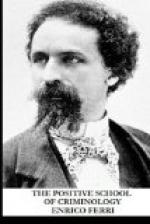All this may take place in the case of a grave and strange crime. And on the other hand, go to the municipal courts or to the police courts, where the magic lantern of justice throws its rays upon the nameless human beings who have stolen a bundle of wood in a hard winter, or who have slapped some one in the face during a brawl in a saloon. And if they should find a defending lawyer who would demand the appointment of a medical expert, watch the reception he would get from the judge. When justice is surprised by a beastly and strange crime, it feels the entire foundation of its premises shaking, it halts for a moment, it calls in the help of legal medicine, and reflects before it sentences. But in the case of those poor nameless creatures, justice does not stop to consider whether that microbe in the criminal world who steals under the influence of hereditary or acquired degeneration, or in the delirium of chronic hunger, is not worthy of more pity. It rather replies with a mephistophelian grin when he begs for a humane understanding of his case.
[A] Article 46: “A person is not subject to punishment, if at the moment of his deed he was in a mental condition which deprived him of consciousness or of the freedom of action. But if the judge considers it dangerous to acquit the prisoner, he has to transfer him to the care of the proper authorities, who will take the necessary precautions.”
[B] Article 47: “If the mental condition mentioned in the foregoing article was such as to considerably decrease the responsibility, without eliminating it entirely, the penalty fixed upon the crime committed is reduced according to the following rules:




